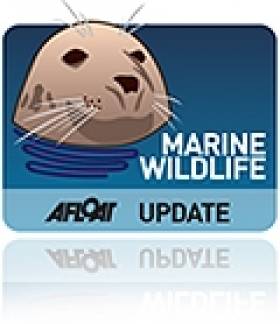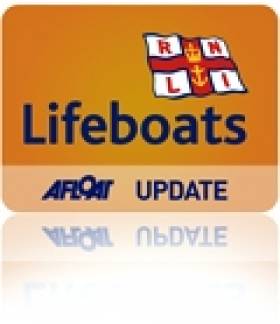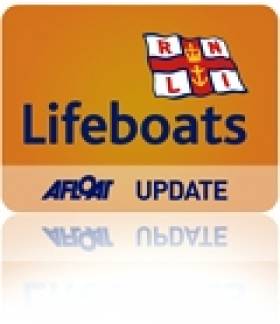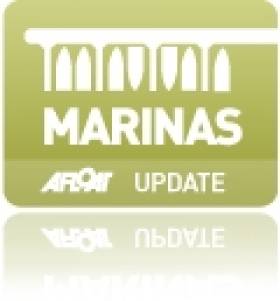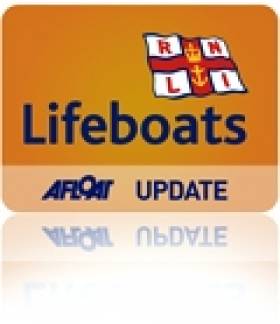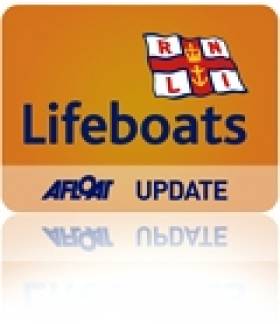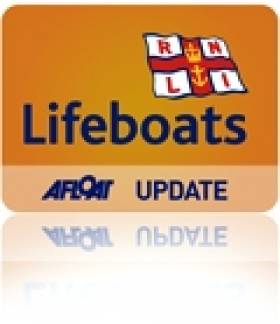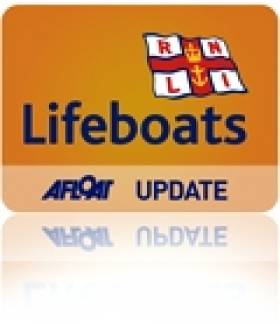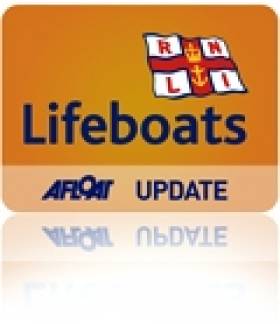Displaying items by tag: Arklow
Akrlow Seal 'Sammy' Rescued Near Rocky Shoreline
#MarineWildlife - On Friday morning (3 April) Arklow RNLI was made aware of a seal apparently caught in fishing gear close to the Arklow Harbour entrance.
Two of Arklow RNLI’s team went to the area to ascertain if it was feasible to launch the lifeboat to rescue the weary marine mammal, identified locally as Sammy - the subject of a previous rescue some 18 months ago when still a pup.
Due to conditions in the area and due to the proximity of the shoreline and an ebbing tide at the location, it was decided it was inadvisable to launch the Ger Tigchelaar.
Because of the trapped animal's proximity to the shore, and to eliminate the further risk of any members of the public entering the water to save the seal, it was decided instead to try to rescue the animal from a smaller rescue craft.
Two of Arklow RNLI’s volunteers, station mechanic Michael Fitzgerald, and Brian Heaney, went to sea to the aid of the tiring animal.
After hauling in the fishing gear, the exhausted and stressed seal was moved to an area where it could make for the shore to rest and was then cut loose from the fishing gear.
The seal had a short break on the lower rocks of the shoreline before making for open water.
Speaking following the incident, Fitzgerald said: “Luckily we were able to get to the seal in time to save it.
"When members of the pubic come across injured or stressed animals like this trapped in fishing gear or injured, they should inform the authorities immediately, they should never enter the water to try to save the animal.
"They should always leave this to persons who are experienced and have the right equipment to carry out the rescue safely. Always respect the water.”
Wicklow Lifeboat Launches To Rescue Kitesurfer
#RNLI - Wicklow RNLI's all-weather lifeboat launched at 5.10pm on Saturday (28 March) to assist a kitesurfer in difficulty off Potters Point, south of Wicklow Head.
The kitesurfer was unable to get ashore after leaving the beach at Jack’s Hole. One of his friends saw him in the water and immediately contacted the Irish Coast Guard for help.
Conditions in the area at the time had a south-easterly Force 6 wind with a moderate sea state.
"We located the kitesurfer drifting off the south end of the Wolf Rock near Jack’s Hole," said Wicklow RNLI coxswain Nick Keogh after the callout. "He was using the floatation end of the kite equipment to stay afloat, after he got separated from his board."
A first-aid-trained member of the lifeboat crew assessed the casualty as they returned to Wicklow. He had no injuries and did not require any further medical assistance. The man was landed safely ashore at Wicklow Harbour at 6.30pm.
The crew on the callout were Keogh, mechanic Connie O'Gara, Ciaran Doyle, Terry Sillery, Graham Fitzgerald, John Vize and David Collard.
Arklow's nearby RNLI lifeboat was also requested to launch but was stood down by the coastguard as Wicklow took command of the situation.
Mark Corcoran, Arklow RNLI volunteer lifeboat press officer, hailed the "lightning response by both RNLI volunteer crews at Arklow and Wicklow" which "shows the dedication our volunteers have to saving lives at sea".
Corcoran, who is also Arklow's sea safety officer, added: “All persons who take to the water over the coming summer months must always wear their lifejackets and should always have a means of raising the alarm."
Any groups or individuals who would like advice on any water safety issue from kayaking to sailing, angling, kitesurfing or windsurfing can contact Corcoran at 086 826 0439 or [email protected].
Arklow Lifeboat's Sunday Afternoon Launch To Fishing Vessel
#RNLI - Arklow's RNLI lifeboat Ger Tigchleaar was launched within minutes in response to a call for help from a local fishing vessel yesterday afternoon (Sunday 8 March).
The vessel had suffered engine failure and was without navigation ability approximately 15 miles south of Arklow.
The volunteer crew consisting of coxswain Eamonn Kavanagh, station mechanic Michael Fitzgerald, Jimmy Myler, Craig O’Reilly, David Lee, James Russell and Cead Muller dropped their normal Sunday afternoon family activities and rushed to the lifeboat station.
After launching the lifeboat and locating the casualty vessel, they established a tow line and proceeded with the long slow tow back to Arklow.
All three crew members on the casualty vessel remained aboard during the tow home and all hands came ashore safely at Arklow Harbour.
New Marina For Arklow, County Wicklow
#arklowberths –In a further boost for marine lesiure and the necklace of Irish marinas around the coast, the 'Garden County' has announced 20 new berths for Arklow Harbour. It's a bid, says Arklow Harbourmaster Paul Ivory, 'to generate tourism and providing additional berthing facilities for the Arklow area'.
Ivory expects the new facility, built by Irish firm Inland and Coastal, to open before the end of the year.
It's another berthing option that follows on the successful opening of the 200–berth Greystones Harbour Marina in April 2013.
Commissioning work is still taking place in Arklow (see pontoon layout above) and rates have yet to be calculated by Wicklow County Council, who now operate Arklow Harbour.
The Marina is located in the Dock at Arklow, which has been recently dredged to an average depth of 3.0m Chart Datum, acccording to Ivory.
The new pontoons have the following berth capacity; 4 x 10m vessels on 7.5m long berths and 16 x 12m vessels on 9m long berths.
Further details are as follows:
General:
− Wheelchair accessible gangway
− Rolec service pedestals for 16amp electricity supply with smart card metering
− Fresh water taps at each pedestal
− Safety ladders and lifebuoys fitted
− Security gate at gangway
− No toilet, shower or laundry services available yet
− Price of berths to be published soon
Technical:
− Built by Inland & Coastal Marina Systems Ltd.
− Walkway units with mooring cleats, 500mm freeboard
− Berth spacings are as per Pianc (The World association for Waterborne Transport Infrastructure) guidelines
− Hardwood timber fenders
− Glassfibre Reinforced Concrete (GRC) decking
− Floatation provided by GRC encased expanded polystyrene floats, minimum GRC skin thickness 10mm
Arklow Lifeboat Rescues Stricken Offshore Powerboat
#RNLI - Following an alert by pager on Sunday 21 September, Arklow RNLI’s lifeboat Ger Tigchlear was launched within minutes to the aid of a powerboat with three persons aboard that was reported to be taking on water.
In calm conditions, the volunteer crew proceeded to scene, and after locating the vessel some two miles south-east of Arklow, a towline was quickly established to get the vessel back to port as quickly as possible.
Upon arrival at Arklow Harbour, where all hands were brought ashore safely, it was decided that due to the level of water that had entered the vessel, the salvage pump needed to be put aboard to enable refloating.
Once the water was cleared, repairs were made and the vessel was refloated and returned to her berth at Arklow Marina.
Speaking following the incident, coxswain Aidan Downey said: “This was a close call. If there had been any delay in alerting the lifeboat, this vessel would have been lost.
"Thankfully we were able to get to the casualty in the nick of time.”
Arklow Lifeboat Tows Local Fishing Vessel To Safety
#RNLI - Arklow RNLI’s volunteers were alerted by pager at 9.22am yesterday morning (Wednesday 20 August) and launched the lifeboat Ger Tigchleaar within minutes to a call for help from a local fishing vessel with engine problems.
In a moderate sea, the lifeboat crew – coxswain Ned Dillon, mechanic Michael Fitzgerald, Roger Tyrell, John Bermingham, Andy O'Loughlin and Jimmy Myler – proceeded to scene.
After locating the casualty vessel 11 miles south southeast of Courtown, the RNLI crew established a tow line and proceeded with the long slow tow back to Arklow, arriving at 11.30am.
The two crewmembers aboard the casualty vessel remained aboard during the tow home and all hands came ashore safely at Arklow.
Speaking following the incident, volunteer lifeboat press officer and sea safety officer Mark Corcoran said: “All persons who take to the water, whether for a living or for pleasure, must always wear their lifejackets and should always have a means of raising the alarm.
"Even with the years of experience these professional fishermen have, mechanical problems can still occur. Please don’t take chances when going to sea.”
#RNLI - Arklow RNLI’s volunteers gave the World Cup final the boot last night (Sunday 13 July) to respond to a pleasure craft in difficulty with three people on board.
Most of the lifeboat crew were settling down to watch the game at 8pm when the pager alert came in. The crew dropped what they were doing and made straight for the lifeboat station.
Within minutes of the alert, the all-weather lifeboat Ger Tigchlearr was en route to the distressed vessel, which was a short distance from the Roadstone Jetty, south of Arklow Harbour.
Once on scene it was established that the pleasure craft was taking on water and the three crew members were evacuated to the lifeboat.
A tow line was set up and the small pleasure craft was towed back to Arklow lifeboat station, where the volunteers brought the vessel safely up on to the inner slipway.
The three crew of the stricken pleasure craft were brought ashore safely at the lifeboat station.
Following the shout, Arklow RNLI deputy launching authority Declan Smullen gave "thanks to all of our volunteers who drop everything in their personal lives when the pagers sound and go to sea in all weathers, 24/7, to save lives at sea."
Arklow RNLI To Feature In RTÉ Series 'Abhainn'
#RNLI - Volunteers from Arklow RNLI in Co Wicklow are to feature in RTÉ's Irish language programme Abhainn.
The TV series features the rivers of Ireland, and this episode (to be broadcast in September) looks at the Avoca River from its source high up in Wicklow Mountains to the river mouth at Arklow.
An RTÉ film crew spent the afternoon and evening of Thursday 5 June filming at what is the oldest of the RNLI's lifeboat stations in Ireland.
During the day the film crew had the opportunity to experience firsthand and get a glimpse of the level of training required by the highly skilled and efficient RNLI volunteers in their lifesaving work, which can often be difficult and sometimes dangerous.
New station operations manager John Tyrrell said: "Filming with RTÉ was a great opportunity to showcase the commitment of volunteers not only in Arklow but in the many other coastal and inland water communities across Ireland."
He added that the RNLI wouldn’t exist without fundraising. The charity is totally reliant on the generosity of the public and indebted to the work of fundraisers at station branches as well as those raising money inland.
"It is because of the willingness and selfless nature of our volunteers, who will readily swap leisure, comfort and sleep for cold, wet and fatigue, that the charity can provide an on-call, 24-hour lifeboat search and rescue service here," said Tyrrell.
Arklow Lifeboat Assists Adrift Fishing Vessel
#RNLI - Arklow RNLI’s volunteers were alerted by pager at 09:47am yesterday morning (Wednesday 4 June) to a call for help from a local fishing boat.
The vessel had suffered a fouled propeller and was adrift just south of Cahore Point, halfway between Arklow and Wexford.
The lifeboat Ger Tigchleaar and crew - consisting of coxswain Roger Tyrell, station mechanic Michael Fitzgerald, Andrew Loughlin, Jimmy Myler, Craig O’Reilly, David Lee and Scott Heaney - launched within minutes and proceeded to scene.
After locating the casualty vessel, the lifeboat crew established a tow line and proceeded with the long slow tow back to Arklow, arriving back at the station at 2.20pm.
All four crew aboard the fishing boat remained aboard during the tow home and all hands came ashore safely at Arklow.
Speaking following the incident, volunteer lifeboat press officer and sea safety officer Mark Corcoran said: "All people who take to the water whether for a living or for pleasure should always wear their lifejackets and have a means of raising the alarm."
#RNLI - Arklow RNLI's lifeboat Ger Tigchlearr and its volunteer crew launched at first light yesterday morning (13 May) to go to the aid of a local fishing vessel.
Within minutes of the pager alert at 5.45am the lifeboat was making for the casualty vessel, which was approximately 16 miles south of Arklow, arriving on scene approximately 40 minutes later.
Once in position, the lifeboat crew secured a tow line to the casualty vessel, a 45ft local fishing vessel with four crew members aboard that had developed engine trouble and was adrift.
When the lifeboat crew made fast the towline, they proceeded to tow the casualty vessel back to Arklow. Upon arrival shortly after 9.30am, the casualty vessel was brought alongside where the crew came ashore safely.
Commenting later, Arklow RNLI lifeboat sea safety officer Mark Corcoran said: “Even experienced fishermen and sailors can be caught out while at sea, be prepared, never take chances and always wear a lifejacket.”
The volunteer crew for this shout were coxswain Ned Dillon, mechanic Michael Fitzgerald, Eddie McElheron, Andrew Loughlin, Jimmy Myler, Craig O’Reilly and James Russell.



























